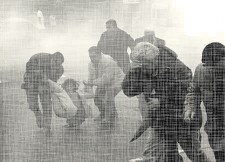 |






 AfricaSpeaks Weblog AfricaSpeaks Weblog
 Rootswomen Weblog Rootswomen Weblog
 Rootsie's Weblog Rootsie's Weblog
|
Interview With Chomsky: In Depth Discussion on Israel/Palestine
Posted: Wednesday, April 3, 2002
by Noam Chomsky
April 02, 2002
Z: Is there a qualitative change in what's happening now?
 I think there is a qualitative change. The goal of the Oslo process was accurately described in 1998 by Israeli academic Shlomo Ben-Ami just before he joined the Barak government, going on to become Barak's chief negotiator at Camp David in summer 2000. Ben-Ami observed that "in practice, the Oslo agreements were founded on a neo-colonialist basis, on a life of dependence of one on the other forever." With these goals, the Clinton-Rabin-Peres agreements were designed to impose on the Palestinians "almost total dependence on Israel," creating "an extended colonial situation," which is expected to be the "permanent basis" for "a situation of dependence." The function of the Palestinian Authority (PA) was to control the domestic population of the Israeli-run neocolonial dependency. That is the way the process unfolded, step by step, including the Camp David suggestions. The Clinton-Barak stand (left vague and unambiguous) was hailed here as "remarkable" and "magnanimous," but a look at the facts made it clear that it was -- as commonly described in Israel -- a Bantustan proposal; that is presumably the reason why maps were carefully avoided in the US mainstream. It is true that Clinton-Barak advanced a few steps towards a Bantustan-style settlement of the kind that South Africa instituted in the darkest days of Apartheid. Just prior to Camp David, West Bank Palestinians were confined to over 200 scattered areas, and Clinton-Barak did propose an improvement: consolidation to three cantons, under Israeli control, virtually separated from one another and from the fourth canton, a small area of East Jerusalem, the center of Palestinian life and of communications in the region. And of course separated from Gaza, where the outcome was left unclear. I think there is a qualitative change. The goal of the Oslo process was accurately described in 1998 by Israeli academic Shlomo Ben-Ami just before he joined the Barak government, going on to become Barak's chief negotiator at Camp David in summer 2000. Ben-Ami observed that "in practice, the Oslo agreements were founded on a neo-colonialist basis, on a life of dependence of one on the other forever." With these goals, the Clinton-Rabin-Peres agreements were designed to impose on the Palestinians "almost total dependence on Israel," creating "an extended colonial situation," which is expected to be the "permanent basis" for "a situation of dependence." The function of the Palestinian Authority (PA) was to control the domestic population of the Israeli-run neocolonial dependency. That is the way the process unfolded, step by step, including the Camp David suggestions. The Clinton-Barak stand (left vague and unambiguous) was hailed here as "remarkable" and "magnanimous," but a look at the facts made it clear that it was -- as commonly described in Israel -- a Bantustan proposal; that is presumably the reason why maps were carefully avoided in the US mainstream. It is true that Clinton-Barak advanced a few steps towards a Bantustan-style settlement of the kind that South Africa instituted in the darkest days of Apartheid. Just prior to Camp David, West Bank Palestinians were confined to over 200 scattered areas, and Clinton-Barak did propose an improvement: consolidation to three cantons, under Israeli control, virtually separated from one another and from the fourth canton, a small area of East Jerusalem, the center of Palestinian life and of communications in the region. And of course separated from Gaza, where the outcome was left unclear.
But now that plan has apparently been shelved in favor of demolition of the PA. That means destruction of the institutions of the potential Bantustan that was planned by Clinton and his Israeli partners; in the last few days, even a human rights center. The Palestinian figures who were designated to be the counterpart of the Black leaders of the Bantustans are also under attack, though not killed, presumably because of the international consequences. The prominent Israeli scholar Ze'ev Sternhell writes that the government "is no longer ashamed to speak of war when what they are really engaged in is colonial policing, which recalls the takeover by the white police of the poor neighborhoods of the blacks in South Africa during the apartheid era." This new policy is a regression below the Bantustan model of South Africa 40 years ago to which Clinton-Rabin-Peres-Barak and their associates aspired in the Oslo "peace process."
None of this will come as a surprise to those who have been reading critical analyses for the past 10 years, including plenty of material posted regularly on Znet, reviewing developments as they proceeded.
Exactly how the Israeli leadership intends to implement these programs is unclear -- to them too, I presume.
It is convenient in the US, and the West, to blame Israel and particularly Sharon, but that is unfair and hardly honest. Many of Sharon's worst atrocities were carried out under Labor governments. Peres comes close to Sharon as a war criminal. Furthermore, the prime responsibility lies in Washington, and has for 30 years. That is true of the general diplomatic framework, and also of particular actions. Israel can act within the limits established by the master in Washington, rarely beyond.
Z: What is the meaning of March 30th's Security Council Resolution?
The primary issue was whether there would be a demand for immediate Israeli withdrawal from Ramallah and other Palestinian areas that the Israeli army had entered in the current offensive, or at least a deadline for such withdrawal. The US position evidently prevailed: there is only a vague call for "withdrawal of Israeli troops from Palestinian cities," no time frame specified. The Resolution therefore accords with the official US stand, largely reiterated in the press: Israel is under attack and has the right of self-defense, but shouldn't go too far in punishing Palestinians, at least too visibly. The facts -- hardly controversial -- are quite different. Palestinians have been trying to survive under Israeli military occupation, now in its 35th year. It has been harsh and brutal throughout, thanks to decisive US military and economic support, and diplomatic protection, including the barring of the long-standing international consensus on a peaceful political settlement. There is no symmetry in this confrontation, not the slightest, and to frame it in terms of Israeli self-defense goes beyond even standard forms of distortion in the interests of power. The harshest condemnations of Palestinian terror, which are proper and have been for over 30 years, leave these basic facts unchanged.
In scrupulously evading the central immediate issues, the March 30 Resolution is similar to the Security Council Resolution of March 12, which elicited much surprise and favorable notice because it not only was not vetoed by the US, in the usual pattern, but was actually initiated by Washington. The Resolution called for a "vision" of a Palestinian state. It therefore did not rise to the level of South Africa 40 years ago when the Apartheid regime did not merely announce a "vision" but actually established Black-run states that were at least as viable and legitimate as what the US and Israel had been planning for the occupied territories.
Z: What is the U.S. up to now? What U.S. interests are at stake at this juncture?
The US is a global power. What happens in Israel-Palestine is a sidelight. There are many factors entering into US policies. Chief among them in this region of the world is control over the world's major energy resources. The US-Israel alliance took shape in that context. By 1958, the National Security Council concluded that a "logical corollary" of opposition to growing Arab nationalism "would be to support Israel as the only strong pro-Western power left in the Middle East." That is an exaggeration, but an affirmation of the general strategic analysis, which identified indigenous nationalism as the primary threat (as elsewhere in the Third World); typically called "Communist," though it is commonly recognized in the internal record that this is a term of propaganda and that Cold War issues were often marginal, as in the crucial year of 1958. The alliance became firm in 1967, when Israel performed an important service for US power by destroying the main forces of secular Arab nationalism, considered a very serious threat to US domination of the Gulf region. So matters continued, after the collapse of the USSR as well. By now the US-Israel-Turkey alliance is a centerpiece of US strategy, and Israel is virtually a US military base, also closely integrated with the militarized US high-tech economy.
Within that persistent framework, the US naturally supports Israeli repression of the Palestinians and integration of the occupied territories, including the neocolonial project outlined by Ben-Ami, though specific policy choices have to be made depending on circumstances. Right now, Bush planners continue to block steps towards diplomatic settlement, or even reduction of violence; that is the meaning, for example, of their veto of the Dec. 15 2001 Security Council Resolution calling for steps towards implementing the US Mitchell plan and introduction of international monitors to supervise the reduction of violence. For similar reasons, the US boycotted the Dec. 5 international meetings in Geneva (including the EU, even Britain) which reaffirmed that the Fourth Geneva Convention applies to the occupied territories, so that critically important US-Israeli actions there are "grave breaches" of the Convention - war crimes, in simple terms - as the Geneva declaration elaborated. That merely reaffirmed the Security Council Resolution of October 2000 (US abstaining), which held once again that the Convention applied to the occupied territories. That had been the official US position as well, stated formally, for example, by George Bush I when he was UN Ambassador. The US regularly abstains or boycotts in such cases, not wanting to take a public stand in opposition to core principles of international law, particularly in the light of the circumstances under which the Conventions were enacted: to criminalize formally the atrocities of the Nazis, including their actions in the territories they occupied. The media and intellectual culture generally cooperate by their own "boycott" of these unwelcome facts: in particular, the fact that as a High Contracting Party, the US government is legally obligated by solemn treaty to punish violators of the Conventions, including its own political leadership.
That's only a small sample. Meanwhile the flow of arms and economic support for maintaining the occupation by force and terror and extending settlements continues without any pause.
Z: What's your opinion of the Arab summit?
The Arab summit led to general acceptance of the Saudi Arabian plan, which reiterated the basic principles of the long-standing international consensus: Israel should withdraw from the occupied territories in the context of a general peace agreement that would guarantee the right of every state in the region, including Israel and a new Palestinian State, to peace and security within recognized borders (the basic wording of UN 242, amplified to include a Palestinian state). There is nothing new about this. These are the basic terms of the Security Council resolution of January 1976 backed by virtually the entire world, including the leading Arab states, the PLO, Europe, the Soviet bloc, the non-aligned countries -- in fact, everyone who mattered. It was opposed by Israel and vetoed by the US, thereby vetoed from history. Subsequent and similar initiatives from the Arab states, the PLO, and Western Europe were blocked by the US, continuing to the present. That includes the 1981 Fahd plan. That record too has been effectively vetoed from history, for the usual reasons.
US rejectionism in fact goes back 5 years earlier, to February 1971, when President Sadat of Egypt offered Israel a full peace treaty in return for Israeli withdrawal from Egyptian territory, not even bringing up Palestinian national rights or the fate of the other occupied territories. Israel's Labor government recognized this as a genuine peace offer, but decided to reject it, intending to extend its settlements to northeastern Sinai; that it soon did, with extreme brutality, the immediate cause for the 1973 war. The plan for the Palestinians under military occupation was described frankly to his Cabinet colleagues by Moshe Dayan, one of the Labor leaders more sympathetic to the Palestinian plight. Israel should make it clear that "we have no solution, you shall continue to live like dogs, and whoever wishes may leave, and we will see where this process leads." Following that recommendation, the guiding principle of the occupation has been incessant and degrading humiliation, along with torture, terror, destruction of property, displacement and settlement, and takeover of basic resources, crucially water.
Sadat's 1971offer conformed to official US policy, but Kissinger succeeded in instituting his preference for what he called "stalemate": no negotiations, only force. Jordanian peace offers were also dismissed. Since that time, official US policy has kept to the international consensus on withdrawal (until Clinton, who effectively rescinded UN resolutions and considerations of international law); but in practice, policy has followed the Kissinger guidelines, accepting negotiations only when compelled to do so, as Kissinger was after the near-debacle of the 1973 war for which he shares major responsibility, and under the conditions that Ben-Ami articulated.
Official doctrine instructs us to focus attention on the Arab summit, as if the Arab states and the PLO are the problem, in particular, their intention to drive Israel into the sea. Coverage presents the basic problem as vacillation, reservations, and qualifications in the Arab world. There is little that one can say in favor of the Arab states and the PLO, but these claims are simply untrue, as a look at the record quickly reveals.
The more serious press recognized that the Saudi plan largely reiterated the Saudi Fahd Plan of 1981, claiming that that initiative was undermined by Arab refusal to accept the existence of Israel. The facts are again quite different. The 1981 plan was undermined by an Israeli reaction that even its mainstream press condemned as "hysterical," backed by the US. That includes Shimon Peres and other alleged doves, who warned that acceptance of the Fahd plan would "threaten Israel's very existence." An indication of the hysteria is the reaction of Israel's President Haim Herzog, also considered a dove. He charged that the "real author" of the Fahd plan was the PLO, and that it was even more extreme than the January 1976 Security Council resolution that was "prepared by" the PLO, at the time when he was Israel's UN Ambassador. These claims can hardly be true, but they are an indication of the desperate fear of a political settlement on the part of Israeli doves, backed throughout by the US. The basic problem then, as now, traces back to Washington, which has persistently backed Israel's rejection of a political settlement in terms of the broad international consensus, reiterated in essentials in the current Saudi proposals.
Until such elementary facts as these are permitted to enter into discussion, displacing the standard misrepresentation and deceit, discussion is mostly beside the point. And we should not be drawn into it -- for example, by implicitly accepting the assumption that developments at the Arab summit are a critical problem. They have significance, of course, but it is secondary. The primary problems are right here, and it is our responsibility to face them and deal with them, not to displace them to others.
 Printer friendly version Printer friendly version
 Send page by E-Mail Send page by E-Mail
|








